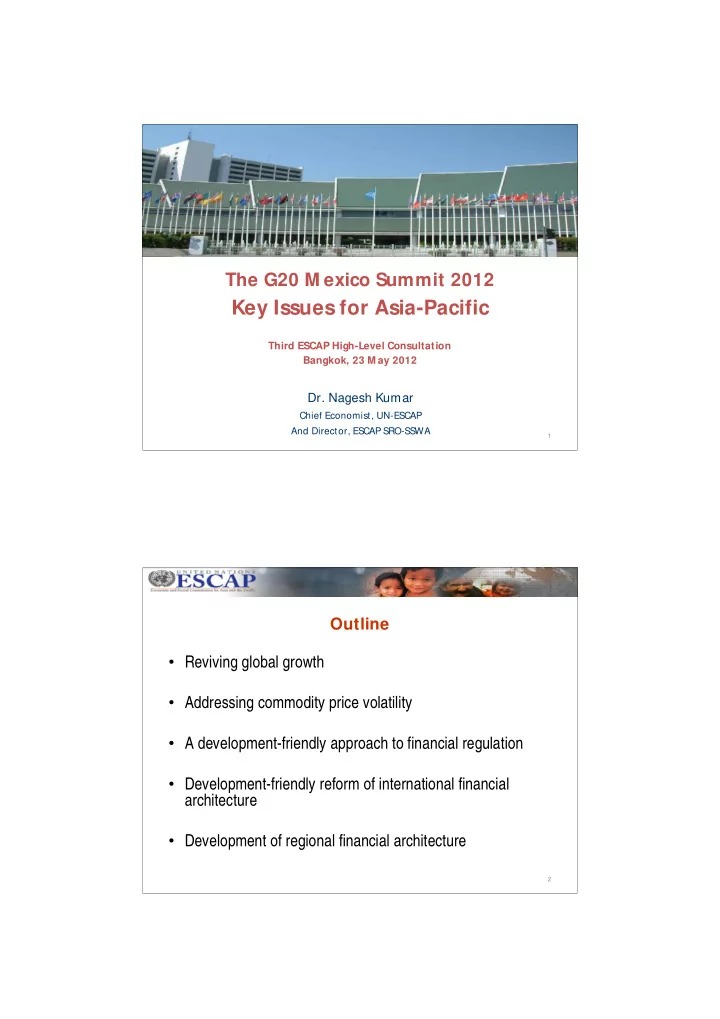

The G20 M exico Summit 2012 Key Issues for Asia-Pacific Third ESCAP High-Level Consultation Bangkok, 23 M ay 2012 Dr. Nagesh Kumar Chief Economist, UN-ESCAP And Director, ESCAP SRO-SS WA 1 Outline • Reviving global growth • Addressing commodity price volatility • A development-friendly approach to financial regulation • Development-friendly reform of international financial architecture • Development of regional financial architecture 2
1. Reviving global growth •Advanced economies started to slow down in 2011 •Growth outlook of A-P also affected with serious down side risks •Global imbalances widening again •Policy responses in developed countries further complicate the situation •austerity programmes •Liquidity expansion •Protectionism •Declining ODA and long-term finance 1. Reviving global growth contd. • Immediate concerted action to boost global growth and jobs creation • counter-cyclical policies and using the fiscal space available in some advanced economies • M edium-term credible and sustainable programme of fiscal consolidation • Avoiding excessive liquidity creation • Roll back of protectionism • Need for sustaining longer-term finance and ODA flows
2. Addressing commodity price volatility • Volatile and rising commodity prices – High food and energy prices affecting growth in developing countries and aggravating poverty situation • G-20 action needs to be – Reversing the neglect of agriculture in public policy for a new sustainable green revolution – Regulating derivatives and financial speculation in commodities markets – Creating global strategic reserves – Agreement to restrict oil prices within a narrow band around a negotiated ‘fair’ price 5 3. A development-friendly approach to financial regulation • Tighter financial sector regulation (Basel III) may limit access to financing in developing countries Access to formal financial services (percentage of households) – No ‘one-size-fits-all’ approach to regulation – Consider impact on trade finance, strengthen facilities to support trade • Curbing excessive risk taking • Regulation of ‘too-big-to-fail’ and systemically important financial institutions • Address inadequate representation of developing countries in the FSB • Strengthen financial inclusion for development 6
4. Development-friendly reform of international financial architecture • Strengthen crisis prevention and management by – Increasing flexibility and coverage of IFI lending facilities • Reform of reserve currency system • Increased availability of longer term resources for development • A global financial transaction tax • A new source of revenue for funding development • Governance reform of IFIs • Better reflect the role of emerging economies • Enhancing the voice and quota of smaller economies 7 5. Development of regional financial architecture Infrastructure Com posite Scores in Asia-Pacific, 2007 • Extending the scope and Papua New coverage of CM IM to make Nepal Lao PDR Solomon Islands it an effective regional Cambodia Bhutan lender of last resort for V anuatu Mongolia Samoa liquidity crisis Tajikistan Tonga Pakistan • Developing regional bond Bangladesh Uzbekistan Philippines markets Indonesia Maldives Kyrgyz Republic • Need to provide Fiji India institutional intermediation V iet Nam Sri Lanka A rmenia for recycling region’s large Georgia Kazakhstan foreign exchange reserves A zerbaijan Iran, Islamic Turkey for infrastructure Thailand China Russian investments Malaysia Brunei – Pooling foreign exchange reserves to Macao, China Hong Kong, create a large scale regional lending A ustralia facility for closing infrastructure gaps Korea, Rep. New Zealand Japan 8 Singapore 0.0 0.1 0.2 0.3 0.4 0.5 0.6 Inde x s core
To conclude • Imperative to revive growth and create jobs and provide a development-friendly global economic environment • Need to address commodity price volatility • More development friendly approach to financial regulation • Addressing the long pending reform of international financial system • Develop a complementary regional financial architecture 9 Thank you www.unescap.org/ pdd 10
Recommend
More recommend